This page has been archived and is being provided for reference purposes only. The page is no longer being updated, and therefore, links on the page may be invalid.
|
|
Potassium: The Overlooked Crop Nutrient?
By Luis PonsJune 15, 2005
Is potassium deficiency limiting corn yields?
Agricultural Research Service (ARS) soil scientists Douglas Karlen and John Kovar think so, and they cite a shift by growers away from preplant tillage as a possible cause.
"No-till" farming has become an important agricultural practice because it offers such benefits as lower energy costs and reduced soil erosion. But the practice may have a side effect in causing potassium--which is naturally recycled as plants decompose--to accumulate in the surface soil where new plant roots cannot capture it, according to Karlen and Kovar. They're based in the ARS Soil and Water Quality Unit, part of the National Soil Tilth Laboratory at Ames, Iowa.
The scientists also question whether increased emphasis on nitrogen and phosphorus management brought on by those nutrients' off-site effects may have led growers and researchers to overlook potassium's importance as an essential plant nutrient.
ARS scientists started investigating the potassium problem in 2000 at a tillage research site initiated in 1971 at Iowa State University's Agronomy and Agricultural Engineering Research Center in Boone County. They noticed that corn and soybean plants grown in no-till plots were susceptible to slow early-season growth and lower yields. The region's growers were experiencing similar problems, according to Karlen. The scientists' goal was to find a way to overcome the slow early-season growth and lower yields while maintaining no-till usage because of no-till's other benefits.
According to Kovar, they found the cause through field tests in which dry fertilizer was placed three inches below the surface, enhancing early-season growth. Follow-up studies pinpointed potassium deficiency as the cause of the growth and yield problems.
Now Karlen, Kovar and the Kansas-based Fluid Fertilizer Foundation are in the middle of a three-year exploration study in which they're directly applying 30 gallons per acre of a liquid potassium solution during planting. The solution penetrates the soil to the root level.
In the first year, the treatment helped boost corn yield by 8 bushels per acre, and soybean yield by more than 2 bushels per acre.
ARS is the U.S. Department of Agriculture's chief scientific research agency.

